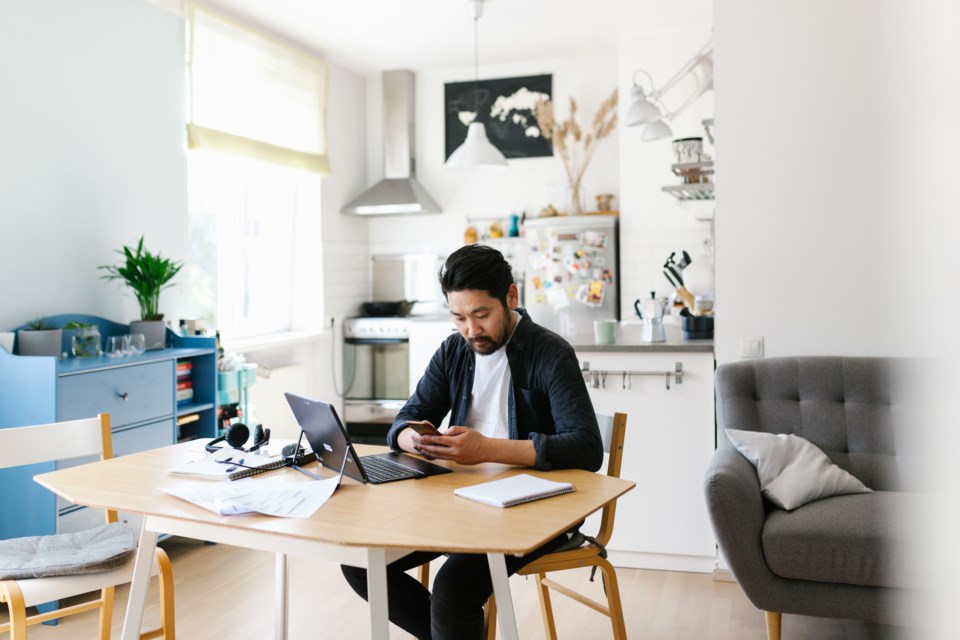Send questions about careers, productivity and work-life balance to [email protected]. Please include your name and location, or request to remain anonymous.
Hey, Colleague:
It's what, 800 days into this pandemic, and I'm still working at my kitchen table. This is life now. Please let me know what I need to do to make this work-from-home thing successful in the long run. —anonymous
Here are some tips I've learned after working from home for almost seven years.
Set your environment up for success. When working from home, you need a dedicated workspace that should be an inspiring area to maximize productivity and increase motivation. Decorating your space with plants and vegetation will also .
Free yourself from clutter. Clutter affects your brain and your productivity and increases stress and anxiety. showed that our brain dislikes disorder and reduces our ability to focus and process information because it drains our cognitive resources. You may not be consciously aware, but your brain perpetually collects information from your environment. Another shows you are more likely to procrastinate when your brain is overwhelmed by clutter. There is a lot of suggesting you keep your space tidy. If this doesn't sound like something you usually do, it's never too late to try. Maybe it will improve the quality of your work and life.
Create a workspace near a window. In regarding attention restoration theory (), researchers found that students who could view more nature outside their window performed better on a battery of tests than those who didn't. Being close to nature reduces , mental fatigue and even ADHD symptoms. If you can't make this happen, bring your laptop outside, or go for walks during your breaks. Our bodies are intelligent creations of the universe, and being outside is when we prosper.
Create a consistent work routine. Routine is vital while working from home because you will feel overwhelmed if you don't organize your thoughts and tasks. Wake up, work, eat and shut down your devices consistently during the day. Don't forget to schedule self-care and family time.
Create a morning routine. I like to get up earlier to perform a mindful morning routine which consists of not checking messages or social media until for at least one hour, guided meditation with , setting intentions, stretching, coffee and journaling. This helps me create momentum and set a peaceful and structured tone for the rest of the day.
Shut down at a definitive time. Working from home is challenging because work and life are blurred. You have to train your mind to shut down at the same time every day, or you run the risk of thinking about work 24/7, which will only add stress and anxiety to your life, impeding your overall well-being.
Communicate expectations and boundaries with anyone you live with. Your spouse, kids, roommates and pets will be distractions at home, and they need to know when not to bother you when you are working. Distraction can come at a high cost because, as suggested in , it takes on average 20 minutes to refocus on a task once your attention has been pulled away.
Meal prep. Prepare your meals the night or week before. I love cooking, and one of my biggest distractions is my kitchen, which I can see from the corner of my eye. I tried to attempt meals from scratch daily but soon found out it was eating into my productivity.
Take breaks. Divide your workday into blocks and take clear breaks to reset and recharge your mind. Use these breaks to eat, stretch, talk to a friend, or go for a walk outside. Our brains aren't meant to be constantly working. Our bodies have a natural work/rest cycle called the , which hypothesizes that our alertness (focus) lasts approximately 90 minutes before our body begins to crave a break—that should be at least 20 minutes to recharge. Ultradian rhythms are oscillating biological patterns hardwired into our DNA, affecting all aspects of our physical, mental, and emotional health. I set up my desk, a timer for 90 minutes, and I try not to get interfered with by distractions—including bathroom breaks, to avoid disrupting a flow state.
Don't forget to communicate with your employer or staff. Understand your remote work expectations and policies. Your team should know when and how to reach you, send your progress reports, resolve issues quickly, promptly reply to crucial messages, and ask for feedback. There is never a more important time for transparency and effective communication.
Accept that not every day will be perfect. Some days you will smash through your to-do list like a productivity machine; other days, you may feel distracted and not get enough done. Please don't beat yourself up, and go with it. Transitions and a drastic change in your environment can be challenging, so you have to learn to adapt to these ups and downs. Be realistic and be kind to yourself.
Kate Pn writes about mastering a healthy work-life balance by focusing on productivity hacking. Write to her at k[email protected].



